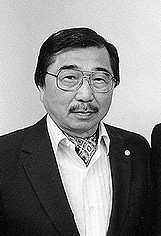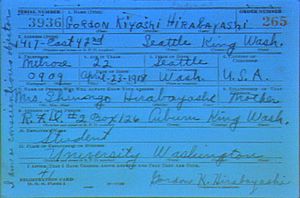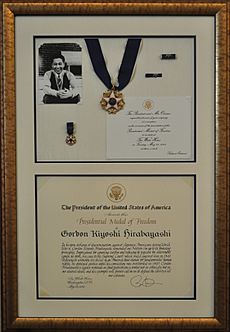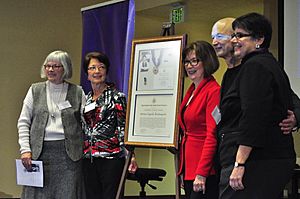Gordon Hirabayashi facts for kids
Quick facts for kids
Gordon Hirabayashi
平林潔 |
|
|---|---|

Gordon Hirabayashi in 1986
|
|
| Born | April 23, 1918 Seattle, Washington, U.S.
|
| Died | January 2, 2012 (aged 93) |
| Nationality | American |
| Alma mater | University of Washington |
| Known for | Hirabayashi v. United States |
| Scientific career | |
| Fields | Sociology |
| Thesis | The Russian Doukhobors of British Columbia: a study of social adjustment and conflict (1951) |
| Doctoral advisor | Robert E.L. Faris |
Gordon Kiyoshi Hirabayashi (平林潔, Hirabayashi Kiyoshi, April 23, 1918 – January 2, 2012) was an American sociologist. He is famous for standing up against the Japanese American internment during World War II. This led to an important court case named after him: Hirabayashi v. United States.
Contents
Gordon Hirabayashi's Early Life
Gordon Hirabayashi was born in Seattle, Washington, on April 23, 1918. He grew up in a Christian family. He went to Auburn Senior High School and then the University of Washington in 1937.
At the university, he joined the YMCA. He also became a pacifist, meaning he believed in peaceful ways to solve problems.
Standing Up for Rights During World War II

During World War II, the U.S. government ordered people of Japanese descent to move to special camps. This was called Japanese American internment. Gordon Hirabayashi decided to openly go against this order.
He was part of the Quaker group, the American Friends Service Committee. In 1942, he turned himself in to the FBI. He was found guilty of breaking a curfew rule and was sentenced to 90 days in prison.
Gordon wanted to challenge the fairness of the internment order in court. The ACLU later supported his case. His case went all the way to the U.S. Supreme Court. But in 1943, the Supreme Court ruled against him in Hirabayashi v. United States.
His Journey to Prison
Because of the war, officials would not take him to prison or even pay for his train ticket. So, Gordon hitchhiked to the prison in Arizona. This prison was called the Catalina Federal Honor Camp.
When he arrived, he was two weeks late. The prison staff didn't have his papers ready. They even suggested he could just go home. But Gordon worried this would look suspicious. They then told him to go out for dinner and a movie. This would give them time to find his paperwork. He agreed, and by the time he returned, they had found his papers.
Later, Gordon spent a year in federal prison at McNeil Island Corrections Center. This was because he refused to join the armed forces. He argued that a survey asking Japanese Americans to give up loyalty to the emperor of Japan was unfair. Other groups were not asked about loyalty to foreign leaders.
After the War: A Career in Sociology
After World War II, Gordon Hirabayashi continued his studies. He earned several degrees in Sociology from the University of Washington.
He taught in Beirut, Lebanon, and Cairo, Egypt. In 1959, he moved to Canada and taught at the University of Alberta. He led the sociology department there from 1970 to 1975. He taught until he retired in 1983.
As a sociologist, he studied different cultures and societies. He looked at social changes in places like Jordan and among the Doukhobors in British Columbia. He also studied Asian Americans. Gordon was also an active member of the Religious Society of Friends in Canada. After retiring, he worked to support human rights.
Gordon Hirabayashi passed away on January 2, 2012, in Edmonton, Alberta. He was 93 years old.
His Conviction is Overturned
After Gordon retired, a professor named Peter Irons found new documents. These papers showed that the government had hidden information in 1942. The government knew there was no military reason for the internment order. But they did not tell this to the U.S. Supreme Court.
With this new information, Gordon's case was looked at again. In 1987, a federal court overturned his criminal conviction. This was a big victory for Gordon and for justice.
Gordon said, "It was a vindication of all the effort people had put in for the rights of citizens during crisis periods." He also explained that he felt the Constitution had failed him at one point. But with the court's decision, he felt the country showed the Constitution is worth protecting.
He believed that "constant vigilance" is needed to keep the Constitution strong. He said, "We had the Constitution to protect us in 1942. It didn't because the will of the people weren't behind it."
Special Recognition
In 1999, the former Catalina Federal Honor Camp in Arizona was renamed in Gordon's honor. It is now called the Gordon Hirabayashi Recreation Site. This is the place where he served his sentence in 1942.
In 2008, the University of Washington gave honorary degrees to Gordon and other Japanese American students. These students had been forced to leave the school during the war. Gordon received a very loud and long applause at the ceremony.
In 2011, a U.S. government official, Neal Katyal, publicly admitted the Justice Department's mistake from 1942. He said the Hirabayashi and Korematsu cases were "blots" on the department's reputation. This showed the importance of being honest when arguing cases for the government.
Public Honors and Awards
Gordon Hirabayashi received many honors for his courage.
U.S. Forest Service Memorial
The Gordon Hirabayashi Recreation Site near Tucson, Arizona, is a public campground. It was renamed in 1999 to honor Gordon. This is where he was sentenced to difficult work in the 1940s.
Gordon also spoke at events about the injustices faced by Japanese Americans during World War II. He stressed that the U.S. Constitution is more than just a piece of paper. He believed that any attempts to go against its ideals should be strongly opposed.
Presidential Medal of Freedom
On April 27, 2012, President Barack Obama announced that Gordon Hirabayashi would receive the Presidential Medal of Freedom. This is one of the highest civilian awards in the United States. He received it for his brave stand against Japanese-American internment.
The President presented the award after Gordon's death on May 29. His family accepted it in Washington. In 2014, the medal was given to the University of Washington Library.
Stage Play About His Life
In 2007, a play based on Gordon Hirabayashi's life story premiered. It was a one-man show called Dawn's Light: The Journey of Gordon Hirabayashi. The play showed Gordon's struggle to understand his country's actions during World War II. It explored how he fought to uphold his belief in the Constitution.
The play was written by Jeanne Sakata. Actor Ryun Yu played Gordon Hirabayashi and other characters. The play was performed in Los Angeles, California.
In 2008, a shorter version of the play was created for students. It was about 45 minutes long and toured schools. In 2010, another tour happened with a new director and actor. This time, a Japanese-American director and actor were used. The show was very well-received.
In 2012, the play was renamed Hold These Truths. It has been performed in many cities across the United States. In May 2022, the first Canadian production of the play was staged in Edmonton, Alberta.
See also
Images for kids
 | Emma Amos |
 | Edward Mitchell Bannister |
 | Larry D. Alexander |
 | Ernie Barnes |




